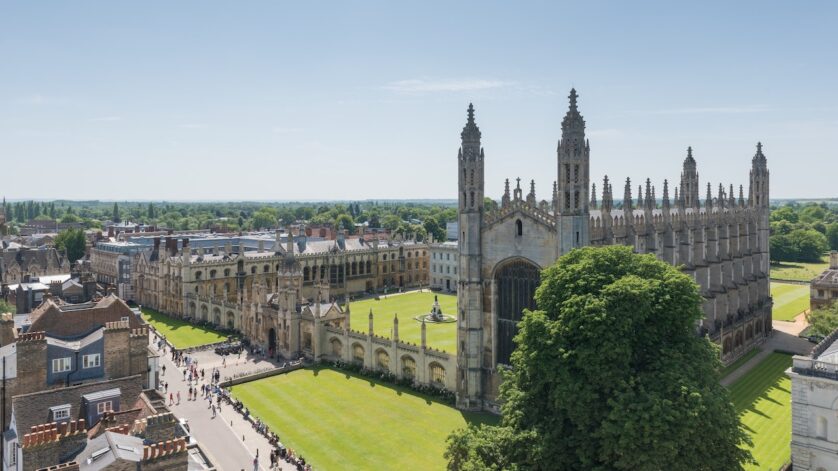Cambridge Student Guide
The city of Cambridge can be found in East Anglia in the county of Cambridgeshire. Cambridge has a high student density with a student population of around 41,000.
Top Things to Do
Punting is a great way to see the city from the River Cam and can make for a fun afternoon, especially in the summer. Punting involves propelling a long, narrow boat along shallow water by using a long pole. For the full Cambridge experience why not take a bottle of champagne and a punnet of strawberries with you? Rowing is also a popular past time and most of the local universities and colleges have their own rowing clubs.
Nightlife
There is no shortage of options for an evening’s entertainment. There are over 110 pubs in the centre of the city, most of which are popular with students. The Cambridge Corn Exchange is the biggest live music venue in the city and showcases a mix of concerts, comedy and theatre. ‘Ballare’ is a popular nightclub in Cambridge, and the club is known for its DJ’s and offers groups the chance to pre-book a booth. Fez Club is one of the more upmarket clubs and showcases impressive Moroccan style interiors and an excellent cocktail menu (the passion fruit mojito is a must!)
Culture
There is no shortage of sights to see around the centre of Cambridge, as the city is steeped in historical sights and buildings, many of which form the campuses. Art fans can take refuge in The Fitzwilliam Museum, one of Britain’s earliest public museums. Collections at the museum include Western European paintings and antiquities from the 14th Century right up to the present day. The museum is also home to a wide range of contemporary sculptures, which can often be seen in the grounds of the museum.
Where Can I Study?
There are two universities in Cambridge: the University of Cambridge and Anglia Ruskin University.
The University of Cambridge (also known as Cambridge University or just Cambridge) is home to around 18,000 students and is a public research university. Cambridge is the second oldest university in the English speaking world (after the University of Oxford) and the seventh oldest in the world.
The university has a strong reputation for academic excellence and consistently ranks in the top ten universities in the world. Graduates from the university have won a total of 65 Nobel Prizes, more than any other university in the world. The Times World University Rankings recently placed Cambridge sixth in the world. Cambridge University is a member of the Coimbra group, the G5, the International Alliance of Research Universities, the League of European Research Universities and the Russell Group.
The University of Cambridge includes 31 colleges, which are comprised of 150 departments and faculties. There are six ‘schools’ in the university, which are used to group together related faculties and units.
The six schools are Arts and Humanities, Biological Sciences, Clinical Medicine, Humanities and Social Sciences, Physical Sciences and Technology. Cambridge has a reputation for being closely linked with the development of high-tech businesses in the city. A Cambridge University press release in 2006 suggested there were around 250 new business start-ups linked directly with the university.
Anglia Ruskin University is much larger in comparison and is home to around 30,000 students. In fact, the university is one of the largest in Eastern England and has campuses in Cambridge and Chelmsford. The university also has centres in King’s Lynn, Peterborough and Harlow and maintains partnerships with educational institutions around the world.
The main campuses at Cambridge and Chelmsford have recently seen over £80 million of investment and offer a number of specialist study facilities including a forensic science lab, a mock courtroom, a music therapy clinic and computer music studios.
Should I Study in Cambridge?
A student’s honest opinion:
“Cambridge has so much to offer. During the day you can wander around the city for hours just looking at all the University of Cambridge college buildings and stroll along the riverside. At night there’s always plenty of pubs and nightclubs and there are many international students parties every week. I’d recommend ‘The Junction’, a very nice nightclub with good DJ’s.
The pubs and nightclubs close early so another alternative for a night out is to go to a house party. House parties are private student parties that take place in shared houses and anybody can go as long you bring a drink. It’s a bit individualistic, but a very good way to meet people, especially with the large student population that Cambridge has. If you hit it off well with other students, you’ll find lots of things to do! Get involved in the community as best as you can to get the most out of the experience.
The ‘Indigo Coffee House’ is also worth a visit, as it is the cutest cafe I’ve ever been, and the service there is really good.” – Clarisse, 23

